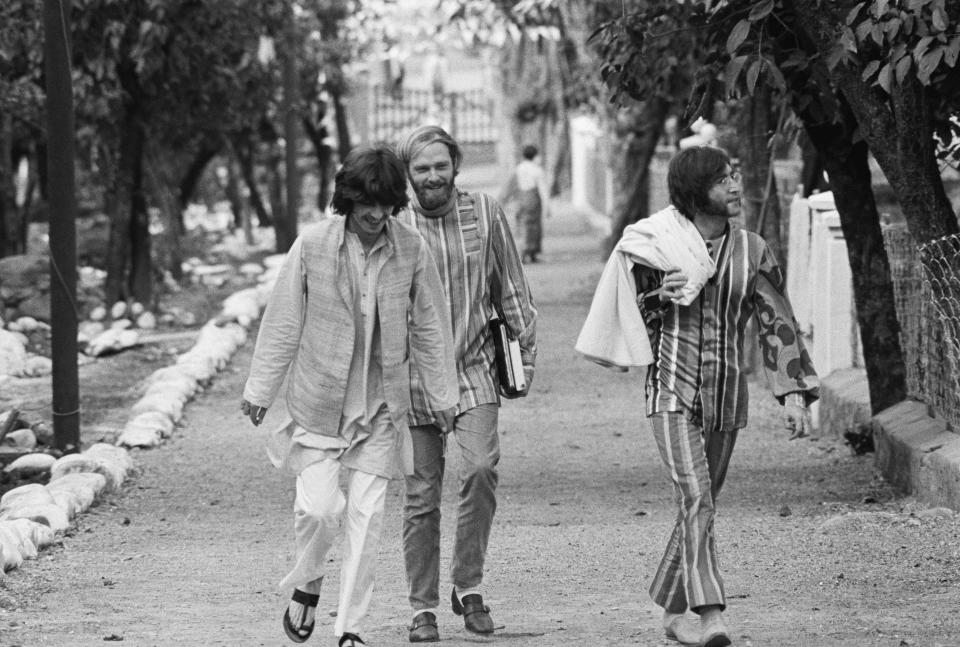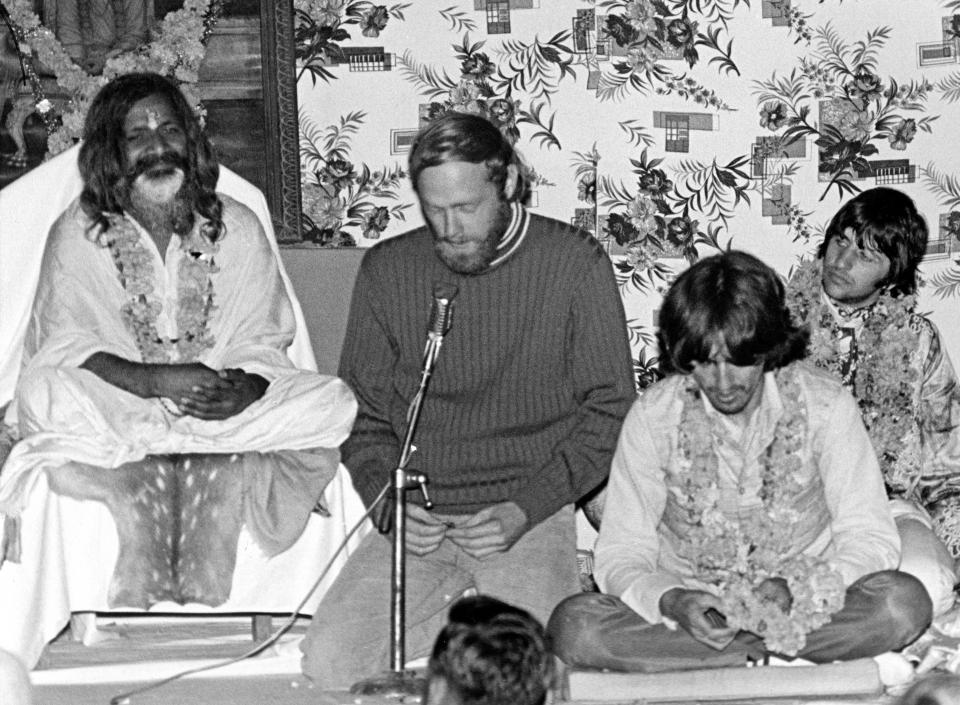Mike Love remembers 'beautiful, spiritual' beginnings of the Beatles' 'White Album' in India
In 1968, the Beach Boys’ Mike Love accepted a personal invitation from Maharishi Mahesh Yogi, the Indian guru known for developing the Transcendental Meditation technique, to take part in an advanced TM training course at the maharishi’s ashram in Rishikesh, India. Much to Love’s surprise, upon his arrival the first Westerners he encountered were his longtime pop-music rivals: Paul McCartney, John Lennon, George Harrison, and Ringo Starr.
“I had traveled to the other side of the world with the expectations of total seclusion, but here I was, impossibly, in the media spotlight, as reporters from all over were trying to cover the Beatles in Rishikesh. It was hard to fathom,” Love recalled in his 2016 memoir, Good Vibrations. “The Beach Boys and the Beatles had been circling each other for the last five years on three different continents — a battle of screaming headlines and devoted groupies and demanding egos — and now I ended up with them in a remote compound with scorpions crawling around at night and monkeys sauntering right up to your dining table in search of scraps.”

Speaking to Yahoo Entertainment a half-century later, Love now recalls his seven weeks in India with the Beatles (and other celebrity participants, including Mia Farrow and Donovan) fondly, saying, “There are so many beautiful, spiritual things that came out of that whole get-together.” And one of those beautiful things was “Back in the U.S.S.R.,” a track from The Beatles — aka The White Album, which is being reissued as a seven-disc, 50th-anniversary boxed set this week and was greatly influenced by the Beatles’ stay in Rishikesh. And the bridge for “Back in the U.S.S.R.,” which McCartney once described in a 1984 Playboy interview “as a kind of Beach Boys parody,” actually originated from a McCartney/Love collaboration during that retreat.
“It was fascinating when Paul McCartney came down with the Blickman steel [guitar]. It was just he and I one morning, and monkeys and crows trying to get your food,” Love remembers with a chuckle. “So, he played this rough song, but he didn’t have the bridge. So I said, ‘You gotta talk about the girls in Russia!’ Because, I was thinking about [the Beach Boys’] ‘California Girls,’ the way we sang, ‘East Coast girls, West Coast girls, Southern girls’ and all that. Well, he did, and I told him ‘Georgia, Moscow,’ and all this other stuff. Turns out he’s quite capable of fashioning a tune! And he did, and he took that concept and wrote that bridge, and he played every instrument on that recording.”
The resulting famous bridge — “Well, the Ukraine girls really knock me out/They leave the West behind/And Moscow girls make me sing and shout/That Georgia’s always on my my my my my my my my my mind” — sounded unmistakably Beach Boys-esque, and Love theorizes, “I think because I was there, [McCartney] started thinking in that kind of vernacular.”
Love, who is still a devout Transcendental Meditation practitioner, also recalls how the India visit inspired another one of The White Album’s most famous tracks. “Prudence [Farrow] was there, Mia’s sister. And John Lennon was taught the guitar fingering technique [“clawhammer”] by Donovan and used it in the song, ‘Dear Prudence,’” he says.
During her stay, a depressed Prudence Farrow reportedly became so serious about her meditation that she holed herself up in her Rishikesh chalet in an attempt to expedite the enlightenment process — so a concerned Lennon wrote “Dear Prudence” to try to coax her out of seclusion. Towards the end of the “Esher demo” version of the song, Lennon can be heard saying of Prudence: “No one was to know that sooner or later, she was to go completely berserk under the care of Maharishi Mahesh Yogi. All the people around were very worried about the girl, because she was going insane. So we sang to her.”
“I know Prudence very well, and she’s a wonderful woman. She’s a TM teacher, like I am as well,” Love, who became a TM teacher in 1971, tells Yahoo Entertainment. “She’s taught thousands of people to meditate. She has a degree in Sanskrit from the University of California at Berkeley, OK? She’s a smart, smart lady. But very devoted too.”
In the glossy, coffee table-worthy book that accompanies the new White Album box, Beatles authority Kevin Howlett stresses, “In the 50 years since the time in India, very flippant remarks, rumors, and journalistic skepticism have tended to undermine the reality of how seriously the Beatles approached their studies there. They were very impressed by the maharishi in his teachings.” However, Love’s fondest memories of his time in India with the Beatles seem to center on Harrison, with whom he connected over an especially deep love for Eastern spirituality.

“We both loved Indian food. He loved Indian music; he studied sitar [with Ravi Shankar]. We loved Maharishi. He was a devotee of the Hare Krishna movement. I think we had a lot in common in that way,” says Love of his bond with Harrison. The two rock legends even celebrated their close-together birthdays in India. “What was really fascinating, on my birthday, March 15, 1968, the Beatles — I mean, Ringo had gone back to England, but John, Paul, and George, and Donovan — all played a song called ‘Spiritual Regeneration Movement Foundation.’ At the end of it, he goes, “Happy Birthday, Michael Love,’” Love remembers with a smile. After Harrison passed away, Love wrote a “very sentimental song” for him, “Pisces Brothers,” which appears on Love’s 2017 solo album, the Unleash the Love.
The Beatles’ stay at Maharishi Mahesh Yogi’s ashram — a place where, notably, they had no electric instruments — turned out to be the group’s most creative songwriting period. Lennon returned from the trip with 15 tunes, McCartney with seven, and Harrison with five; Starr also finished his first solo composition, “Don’t Pass Me By,” during his stay. (Some reports say the Beatles returned from Rishikesh with 30 to 48 songs, but regardless, 18 of those songs eventually ended up on the original White Album release.) It soon became apparent that there were enough songs for a double album. According to Howlett’s White Album box liner notes, while still in India, Lennon sent a postcard to Starr (who’d only lasted 10 days at the ashram before flying home), saying, “We’ve got about two LPs worth of songs now, so get your drums out.”
In May 1968, the Beatles convened at Kinfauns, Harrison’s English countryside bungalow in Esher, Surrey, where they recorded 27 rough tracks on Harrison’s reel-to-reel tape deck — capturing the acoustic feel of their Rishikesh writing sessions. During a White Album press listening event at Hollywood’s Capitol Studios in September, the late Beatles producer Sir George Martin’s son, Giles Martin (who oversaw the 50th anniversary White Album box) marveled at the relaxed, joyful vibe of these home recordings — long known as the much-bootlegged, above-mentioned “Esher demos,” which now comprise the third disc of the new boxed set.
“It was like Champagne popping out of a Champagne bottle — they had so much material. And they wanted to record everything,” said the younger Martin. “None of the band members knew the songs that well. It was almost as if they were passing a guitar around a campfire, saying, ‘Paul, what do you got?’ ‘John, what do you got?’ ‘George, what do you got?’ And you can hear Ringo or someone banging a tambourine or tables in the background. … So, we had this extraordinary situation where the Beatles went from almost around the campfire, playing their demos for each other, to going into the studio.”
Added Martin: “The perception is The White Album is fragmented; it’s the sound of the Beatles breaking up. And going through all of these tapes and everything, it really isn’t.”
On the subject of friendship, Love describes the Beach Boys’ relationship with the Beatles in the 1960s as more of a “mutual admiration” than a rivalry, but says they always spurred each other on creatively, in India and elsewhere. (He proudly recalls a time when the Beach Boys’ Bruce Johnston flew to England to play the acetate of the Beach Boys’ landmark 1966 album, Pet Sounds, for McCartney and Lennon, after which the Beatles “got busy doing whatever they did” with The White Album’s equally adventurous 1967 predecessor, Sgt. Pepper’s Lonely Hearts Club Band.)
“How could you not like [the Beatles’] songs? And they loved the Beach Boys stuff, too. … We were friends,” Love gushes. “That was a very special time [in India]. Very sweet.”
Read more from Yahoo Entertainment:
‘White Album Super Deluxe’ is a revelatory dive into their frayed late-’60s drama
Brian Wilson, Mike Love, and surviving Beach Boys put bad blood aside for rare interview
Giles Martin on father George Martin’s hearing loss: ‘I became his ears when I was quite young’
Follow Lyndsey on Facebook, Twitter, Instagram, Google+, Amazon, Tumblr, Spotify.
